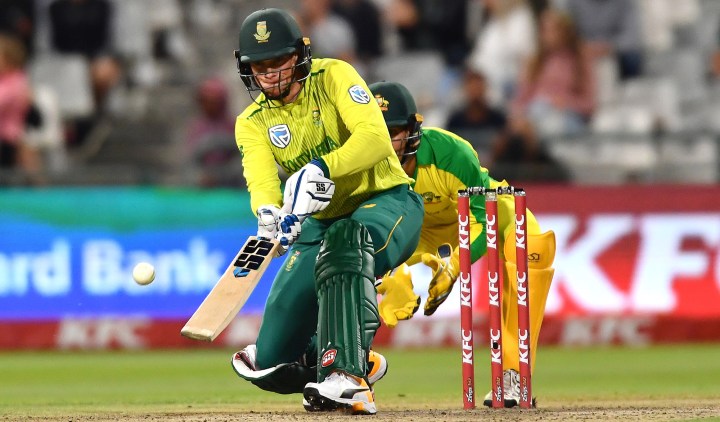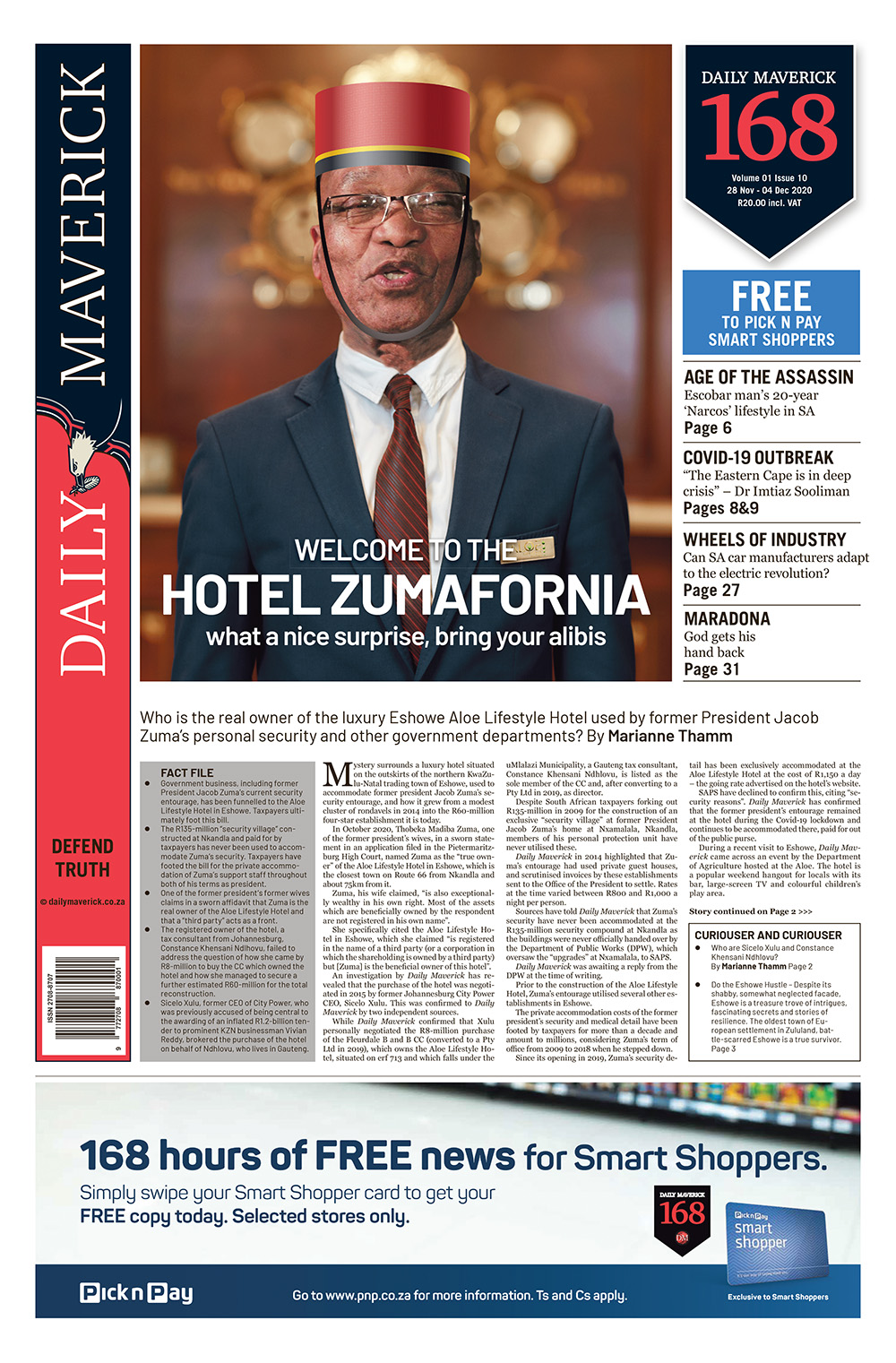DM168 Sport
Fundudzi report hits CSA for a six

The Proteas stepped on to the field for the first time in eight months on Friday night in the same week as the Fundudzi report, which details the breathtaking ineptitude of Cricket South Africa’s (CSA) leadership in the past few years, was made public. It was a good week for cricket.
First published in the Daily Maverick 168 weekly newspaper.
It may not immediately seem obvious, but South African cricket took some giant strides forward over the course of the past seven days.
The Proteas were back on the field in the first of six white-ball internationals against England, while skeletons in the CSA’s closet were outed with the full publication of the Fundudzi forensic report.
Domestic cricket is already in full swing and now the international season has also started. It feels, for once, that cricket is finally emerging from a deep pit of despair, although the clean-up work at board level is only beginning.
The Fundudzi report, which was commissioned by the CSA’s Members Council earlier this year, makes for harrowing reading. Its 456 pages contain jaw-dropping details of a leadership that became increasingly self-serving and despotic.
When Sports Minister Nathi Mthethwa recently appointed an interim board to take over the running of cricket, with the mandate to sort out the mess, the Members Council tried to block the move. They attempted to hide behind the Companies Act and the CSA’s own Memorandum of Incorporation as reasons to stop the takeover.
Fundudzi paints a bleak picture
It was an ironic stance considering the CSA’s leadership failed to adhere to those two documents in its running of cricket. The Fundudzi report shows this in glaring and painful detail. The Members Council, the highest decision-making body in South African cricket, was party to a catalogue of catastrophic decisions that brought the sport to the brink of collapse over the past two years.
The report goes into microscopic detail about issues that have already been in the public domain, adding important context to catastrophic decisions that the CSA took.
Issues such as the banning of five journalists, taking over the running of Western Province Cricket, the breakdown of the relationship with the South African Cricketers’ Association, credit card abuse and several other disastrous decisions are laid bare.
It’s no wonder the previous board and the Members Council tried to keep the report out of the public domain. It confirms all the CSA’s rot, which has been reported on for months, in unflinching detail. And yet it’s not even the complete picture.
A statement from the interim board read: “The board is alive to the fact that some individuals and organisations have concerns that they have been mentioned or implicated in the report, that some individuals have not been heard and that the report does not necessarily paint a full picture.
“The board has nevertheless concluded that it is overwhelmingly in the public interest and in the interest of CSA to release the report at this time.
“All stakeholders will be given a fair opportunity to convey their views. In addition, no action will be taken against any person implicated without a full investigation, fair procedures, and in particular everyone being given the opportunity to be heard.”
Former CEO central to CSA’s failures
The report, unsurprisingly, highlights how the recently sacked CEO, Thabang Moroe, increasingly ran the organisation as a personal club. He flouted basic pillars of good corporate governance and made unilateral decisions with massive consequences.
The former chief operating officer, Naasei Appiah, is also central to many bad decisions, and present company secretary Welsh Gwaza will no doubt come under more scrutiny for his role in several events. Minutes of exco meetings were not always kept and on several occasions the board was misled by executives.
Ultimately though, the report is a catalogue of issues that underline how poorly the CSA was run – in terms of basic corporate governance – for too long. There was a massive failure of controls at board level, which is the central narrative. Whatever Moroe, Appiah and others did would not have happened had the board been more vigilant.
Credit card abuse and botched deals
The report identifies R169,000 in unexplained credit card expenditure by Moroe between August 2017 and September 2019 while Appiah and others, such as former head of sales and sponsor relations Clive Eksteen, also had hefty credit card expenses that didn’t have supporting documentation.
The report does not go as far as using the term “fraud” for the many unaccounted for expenditures, but points out that the CSA did not have a credit card spending policy at the time Moroe became CEO. But Moroe failed to draw up a policy, based on a clause in his contract.
Another of the many issues highlighted in the report is the deal for the sale of the Mzansi Super League broadcast rights to a company called Global Sports Commerce (GSC) for a five-year period, starting with the 2019 edition of the tournament.
Despite advice from Paul Manning, a sports sponsorship expert with a company called IMG, that the CSA should secure an advance from the GSC before going any further with the deal, Moroe ignored the advice and also misled the board.
“There is no evidence that CSA conducted due diligence on GSC as recommended by IMG,” Fundudzi states.
“In fact, Appiah created an impression that there was due diligence conducted by IMG.
“Appiah and Moroe failed to ensure that due diligence was conducted on GSC and provide the said due diligence to FinCom and the board despite numerous requests to do so. Appiah and Moroe further failed to inform FinCom and the board that due diligence was not conducted on GSC.
“On 21 July 2019, Gwaza advised Management not to share IMG’s opinion with FinCom and the board until management had a position on the matter.
“We were not provided with evidence that management further deliberated on the risks identified by IMG relating to the GSC proposal. Appiah and Moroe continued to mislead FinCom and the board that due diligence was conducted on GSC, whereas they knew that the said due diligence had not been conducted.”
The eventual fallout of the botched deal could end up costing the CSA R27.5-million in settlement fees from the GSC.
And so it goes on. The Fundudzi report might not be a complete picture of the CSA’s failings, but it is certainly a harrowing look under the covers into a sordid mess. DM168
You can get your copy of DM168 at these Pick n Pay stores.



















 Become an Insider
Become an Insider
Comments - Please login in order to comment.